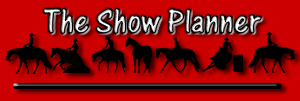 |
|
Show Horse Promotions Mary Murray
|
Building Peak Energy in Performance HorsesMaintaining peak energy in performance horses is always a concern for performance horse owners, especially those who compete speed events. To get the best performance from your horse with the least amount of damage to their bodies you should look at three areas. For muscles to perform at their best you must consider:
Fuel SupplyFuel can come from three sources: glucose in the blood from the breakdown of glycogen in the liver or muscle cells, lactate (which is recycled from the breakdown of glycogen), or fatty acids from the breakdown of triglycerides in fat cells. High carbohydrate diets do raise the glycogen levels in muscles, which can be useful, but these diets can also contribute to metabolic problems in horses such as colic, laminitis, ulcers, or tying up. For this reason many knowledgeable horsemen have started feeding a diet balanced in fat and carbohydrates to supplement the energy needs of their horses. Rice bran, ground flax, or vegetable oils are all good sources of fat for horses. These can be top dressed onto whole grains such as oats, corn, and/or barley. Sweet feeds that contain large amounts of molasses should be avoided because the rapid increase in blood sugar stresses the body and can eventually lead to insulin resistance. Also, horses on sweet feed diets often exhibit excess nervous energy that can make them difficult to handle and more likely to injure themselves. In my opinion giving sweet feed to horses is about as healthy as giving candy bars to children. It can be a nice treat but should not be the sole source of energy in a diet. With the recent interest in high fat diets many manufacturers have created feeds that contain fat. I do not generally like processed feeds because I’m never sure exactly what ingredients are being used. Plus, the processing destroys many nutrients, and larger amounts of preservatives are needed with processed high fat feeds. One exception is Purina’s Equine Senior, a feed that seems to work well for many performance horses. In fact, it’s a perfect substitute for horses that develop ulcers on full grain diets. For horses that work very hard it may be useful to feed some grain in addition to the Equine Senior. Although designed for older horses, Equine Senior provides working horses with a good balance of carbohydrates, fat, and fiber with less risk of digestive problems such as colic or ulcers. Oxygen SupplyThe combination of healthy lungs and good circulation are needed to keep working muscles supplied with plenty of oxygen. Performance horses also need to have enough red blood cells to carry the oxygen. The combination of very heavy exercise, which can break down red blood cells, and chronic blood loss from intestinal ulcers can make many performance horses more susceptible to developing chronic anemia. While there are many synthetic iron tonics on the market I’ve found the whole food blue green algae to be one of the most effective blood tonics. Healthy lungs are critical for good oxygen supply to the muscles. The performance horse’s lungs are often compromised by the stale air in horse trailers and closed barns. Feeding probiotics on a regular basis will help thin the mucous in the lungs so it can be more easily moved out of the body with any debris that the horse breathes in. Mechanical EfficiencyEven the fittest horse cannot perform if his body mechanics are out of balance. Stiffness or lameness will cause the body to work inefficiently, which uses fuel and oxygen at an accelerated rate. Regular chiropractic or other body work will keep the performance horse working at his best. Lack of adequate antioxidants can also slow a top athlete. Free radicals are formed as a natural byproduct of exercise and, if not neutralized, they can lead to tissue damage, muscle stiffness, and joint problems. Natural antioxidants such as blue green algae, wheat sprouts, or Tahitian Noni should be a regular part of the performance horse diet.
To sum things up, make sure you’re offering your performance every chance to succeed: Contributed By: Madalyn Ward, DVM
|
||||||
|
© 2000 - 2010 Show Horse Promotions The Show Horse Promotions web site is an informational web site, this information is subject to change without notice. Any use of, or actions taken based upon any of the information contained on this web site is done entirely at your own risk. Show Horse Promotions expressly prohibit you from republishing or redistributing this content without first receiving our written consent. By using this site, you agree not to hold us liable for any errors or delays in this content, or for any actions that you take in reliance thereon. This site contains links to other Internet sites. These links are not endorsements by us of any products or services in those sites, and we have not endorsed or approved any information in those sites. |
|
||||||||
